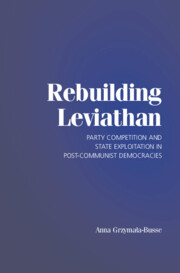Book contents
- Frontmatter
- Contents
- Acknowledgments
- List of Political Party Abbreviations and Acronyms
- 1 INTRODUCTION
- 2 COMPETING FOR THE STATE
- 3 DEVELOPING THE FORMAL INSTITUTIONS OF THE STATE
- 4 THE EXPANSION OF STATE ADMINISTRATION: PATRONAGE OR EXPLOITATION?
- 5 PRIVATIZING THE STATE: PARTY FUNDING STRATEGIES
- CONCLUSION
- APPENDIX A PEAK PARTY ORGANIZATIONS IN POST-COMMUNIST DEMOCRACIES, 1990–2004
- APPENDIX B DETERMINING STATE ADMINISTRATION EMPLOYMENT AND RATE OF GROWTH
- APPENDIX C ANCHORING VIGNETTES
- Bibliography
- Index
- Cambridge Studies in Comparative Politics
3 - DEVELOPING THE FORMAL INSTITUTIONS OF THE STATE
Published online by Cambridge University Press: 05 June 2012
- Frontmatter
- Contents
- Acknowledgments
- List of Political Party Abbreviations and Acronyms
- 1 INTRODUCTION
- 2 COMPETING FOR THE STATE
- 3 DEVELOPING THE FORMAL INSTITUTIONS OF THE STATE
- 4 THE EXPANSION OF STATE ADMINISTRATION: PATRONAGE OR EXPLOITATION?
- 5 PRIVATIZING THE STATE: PARTY FUNDING STRATEGIES
- CONCLUSION
- APPENDIX A PEAK PARTY ORGANIZATIONS IN POST-COMMUNIST DEMOCRACIES, 1990–2004
- APPENDIX B DETERMINING STATE ADMINISTRATION EMPLOYMENT AND RATE OF GROWTH
- APPENDIX C ANCHORING VIGNETTES
- Bibliography
- Index
- Cambridge Studies in Comparative Politics
Summary
The time [to build institutions and] fight against corruption will come after, once the swamp settles.
Prague District Attorney, 1993Thanks to the collapse of communist rule, post-communist democratic parties had the opportunity to gain enormous private benefits with few constraints. Why would they fail to take full advantage of such privileged access to state resources? This is a fundamental question of post-communist state development, since building the formal institutional framework of the state was both a key challenge of state reconstruction and an enormous opportunity for governing parties to build in benefits for themselves.
This chapter argues that faced with a high probability of having to leave office, incumbents would rather constrain themselves, and all subsequent governments, than allow their successors to have access to state resources. Where a robust competition produced a credible threat of replacement to governing parties, post-communist governments deliberately chose to tie their own hands and to limit their leeway in disposing of and redistributing state resources. They built formal state institutions of monitoring and oversight, such as national accounting offices, civil service laws, auditing chambers, or ombudsmen that subjected their actions to legal review and limited their freedom to extract resources needed for their survival. They even turned over the leadership of these agencies to their political competitors: the opposition.
As a result, all the states under consideration privatized state enterprises – but only some developed independent regulation of the auctions and sales.
- Type
- Chapter
- Information
- Rebuilding LeviathanParty Competition and State Exploitation in Post-Communist Democracies, pp. 81 - 132Publisher: Cambridge University PressPrint publication year: 2007
- 1
- Cited by

